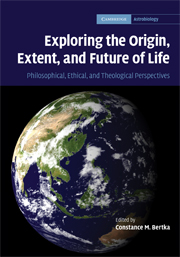 Exploring the Origin, Extent, and Future of Life
Exploring the Origin, Extent, and Future of Life from Part I - Origin of life
Published online by Cambridge University Press: 29 December 2010
Astrobiology, encompassing the search for life on other planets, laboratory studies of the origin of early life forms from precursor materials, and prospects for the discovery of microbial life on other planets reflects outcomes at the cutting edge of science and technology. Yet the issues that such investigations raise are profound, for not only do they bear on our own sense of self in relation to the cosmos, but they also raise deep philosophical and religious issues concerned with purpose, meaning, and human identity. Given these profound challenges, the ethical and moral frameworks within which such developments take place need to be carefully considered, for outcomes of such deliberations have public and social importance alongside a potential scientific gain. The intention of this chapter is to:
analyze those philosophical and theological themes that arise in the context of the origin of life, focusing particularly on the intersection of physical and evolutionary parameters in the interplay of chance and necessity, alongside debates around purpose and design;
consider some of the ethical issues associated with both the origin and future of life from a Christian ethical perspective, including responsibility for future generations;
argue for the recovery of a sense of wisdom, from both a theological perspective and through phronesis or practical wisdom.
It would be impossible to do justice to the full range of possible positions that a theologian might take in relation to theological and ethical issues raised by astrobiology.
To save this book to your Kindle, first ensure [email protected] is added to your Approved Personal Document E-mail List under your Personal Document Settings on the Manage Your Content and Devices page of your Amazon account. Then enter the ‘name’ part of your Kindle email address below. Find out more about saving to your Kindle.
Note you can select to save to either the @free.kindle.com or @kindle.com variations. ‘@free.kindle.com’ emails are free but can only be saved to your device when it is connected to wi-fi. ‘@kindle.com’ emails can be delivered even when you are not connected to wi-fi, but note that service fees apply.
Find out more about the Kindle Personal Document Service.
To save content items to your account, please confirm that you agree to abide by our usage policies. If this is the first time you use this feature, you will be asked to authorise Cambridge Core to connect with your account. Find out more about saving content to Dropbox.
To save content items to your account, please confirm that you agree to abide by our usage policies. If this is the first time you use this feature, you will be asked to authorise Cambridge Core to connect with your account. Find out more about saving content to Google Drive.